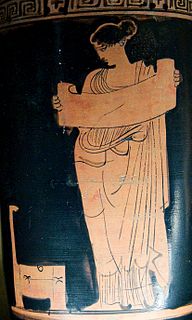 W
WIn ancient Greek religion and mythology, the Muses are the inspirational goddesses of literature, science, and the arts. They were considered the source of the knowledge embodied in the poetry, lyric songs, and myths that were related orally for centuries in ancient Greek culture.
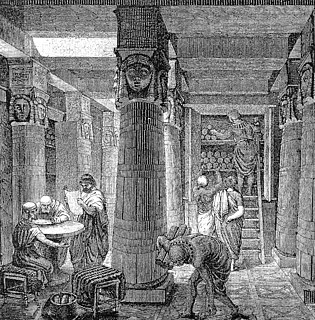 W
WThe Musaeum or Mouseion at Alexandria, which included the famous Library of Alexandria, was an institution said to have been founded by Ptolemy I Soter. This original Musaeum was the home of music or poetry, a philosophical school and library such as Plato's Academy, and also a storehouse of texts. It did not have a collection of works of art; rather it was an institution that brought together some of the best scholars of the Hellenistic world, analogous to a modern university. This original Musaeum was the source for the modern usage of the word museum.
 W
WIn Greek mythology, Calliope is the Muse who presides over eloquence and epic poetry; so called from the ecstatic harmony of her voice. Hesiod and Ovid called her the "Chief of all Muses".
 W
WIn Greek mythology, Clio, also spelled Kleio, is the muse of history, or in a few mythological accounts, the muse of lyre playing.
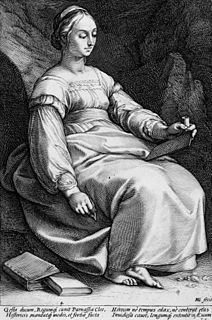 W
WHendrik Goltzius' engraving of Clio is the fourth in his series on the nine Muses, and was executed in 1592.
 W
WDavid Garrick Between Tragedy and Comedy is a 1761 painting by the English painter Joshua Reynolds, depicting the actor and playwright David Garrick caught between the Muses of Tragedy and Comedy. It is regarded as one of Reynolds's most studied and well-known paintings, and is now in the collection of Waddesdon Manor, Buckinghamshire.
 W
WThe Disquieting Muses is a painting by the Italian metaphysical painter Giorgio de Chirico.
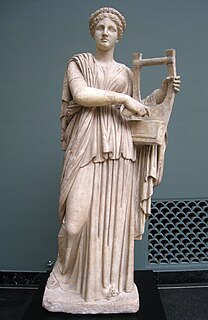 W
WIn Greek mythology, Erato is one of the Greek Muses, which were inspirational goddesses of literature, science, and the arts. The name would mean "desired" or "lovely", if derived from the same root as Eros, as Apollonius of Rhodes playfully suggested in the invocation to Erato that begins Book III of his Argonautica.
 W
WEuterpe was one of the Muses in Greek mythology, presiding over music. In late Classical times, she was named muse of lyric poetry. She has been called “Giver of delight” by ancient poets.
 W
WIn Greek mythology, Melpomene, initially the muse of chorus, eventually became the muse of tragedy, and is now best known in that association.
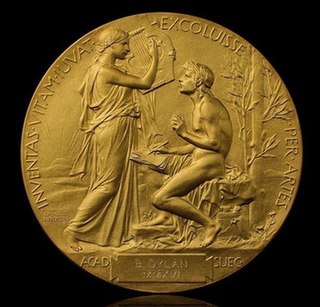 W
W"Mother of Muses" is a song written and performed by the American singer-songwriter Bob Dylan and released as the seventh track on his 2020 album Rough and Rowdy Ways. It is a spare and meditative acoustic folk song in which the first person-narrator offers a paean to Mnemosyne, the goddess of memory in Greek mythology who gave birth to the nine Muses.
 W
WRepresentations or analogues of one or more of the nine Muses of Greek mythology have appeared in many different modern fictional works.
 W
WThe Muses is a 1578 painting by Tintoretto showing the Muses from Greek mythology.
 W
WThe Nine Muses, Or, Poems Written by Nine severall Ladies Upon the death of the late Famous John Dryden, Esq. was an elegiac volume of poetry published pseudonymously. The contributors were English women writers, each of whom signed their poems with the names of Muses. The collection was edited by Delarivier Manley and includes pieces by Susanna Centlivre, Sarah Fyge Egerton, Mary Pix ("Clio"), Catherine Trotter ("Calliope"), and Sarah Piers ("Urania"). The poet writing as "Polimnia" has not been identified; her initials are "Mrs. D. E."
 W
WPolyhymnia, alternatively Polymnia (Πολύμνια) was in Greek mythology the Muse of sacred poetry, sacred hymn, dance, and eloquence as well as agriculture and pantomime.
 W
WTenth Muse is an independent superhero comic book series about a modern-day daughter of the Greek god Zeus. It was created in 2000 by Darren G. Davis and originally written by Marv Wolfman.
 W
WIn Greek mythology, Terpsichore is one of the nine Muses and goddess of dance and chorus. She lends her name to the word "terpsichorean" which means "of or relating to dance".
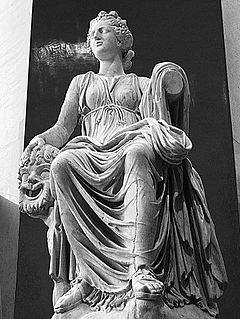 W
WIn Greek mythology, Thalia, also spelled Thaleia, was one of the Muses, the goddess who presided over comedy and idyllic poetry. In this context her name means "flourishing", because the praises in her songs flourish through time.
 W
WUrania was, in Greek mythology, the muse of astronomy, and in later times, of Christian poetry.
 W
WThe Valley of the Muses was the site of an ancient Greek sanctuary to the Muses and the Mouseia festivals held in their honor. It is an open-air historical site open permanently to the public. It is located at Thespies on the eastern slopes of Mount Helicon in Boeotia, Greece.